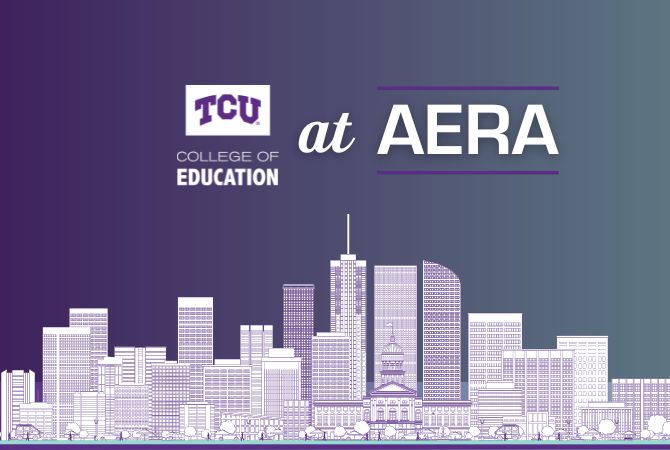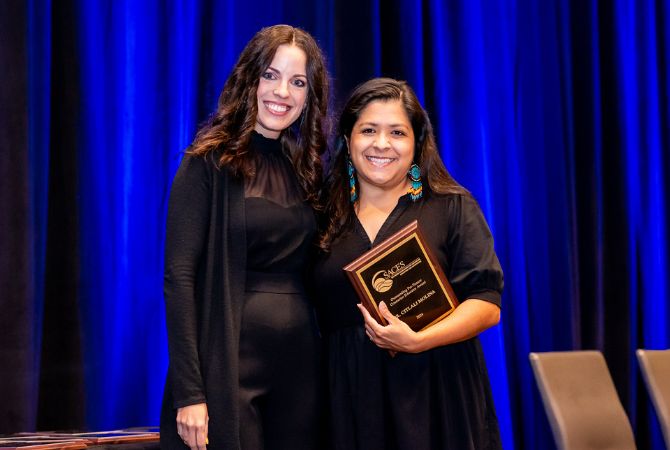A new grant will support TCU’s effort to determine how it has implicitly influenced the inequities found in science, technology, engineering and mathematics (STEM) departments. The National Science Foundation (NSF) grant is titled ADVANCE Catalyst: Faculty Resources and Opportunities for Growth in STEM, also known as FROG in STEM. By identifying barriers and bridges for women STEM faculty, this project aims to produce institutional change that will impact not only STEM, but also all women faculty at TCU.
“Receipt of this award will facilitate our institutional goals to increase the representation and advancement of women among our academic science and engineering faculty and ensure that all our faculty in every discipline are supported and thrive at TCU,” said Floyd Wormley, associate provost for research and dean of graduate studies. “I can think of no better person at TCU than Dr. Weinburgh to lead these efforts, and she has the administration’s full support.”

Molly Weinburgh, Andrews Chair of Mathematics and Science Education and director of TCU’s Andrews Institute for Research in Mathematics & Science Education, credited the entire research team.
“The team is really strong, and all deans wrote letters of support and are looking forward to the results of the study,” she said. “I enjoy any opportunity to engage with faculty across the university. This grant is trans-colleges and trans-disciplines, which will provide many perspectives. There are already faculty and staff working in the areas that are covered by the grant, so some of the work will be pulling together reports and synthesizing recommendations. Although directed at STEM faculty, any positive changes will affect all TCU faculty.”
Francyne Huckaby, associate provost for faculty affairs, is also working on the project and agreed, saying that the self-study the grant makes possible will inform the campus as a whole.
“We are excited to receive this NSF catalyst grant because it will allow us to better understand the dynamics at play in the work experiences of women in STEM at TCU,” Huckaby said. “Such corrective work is important as solutions are better when they are formed and informed by the people closest to the challenge.”
The ADVANCE Catalyst project is grounded in the robust literature of three academic areas: challenges for women in higher education (especially STEM), intersectionality and self-studies in higher education. Combining these bodies of work, the focus is on understanding the institution’s role in cultivating challenges and disparate work contexts for intersectional women faculty.
“Trends in the responses from these surveys, as well as our research into data surrounding faculty, will be used to propose a plan to implement changes that will, ultimately, provide an improved environment for faculty and students at TCU,” said Kayla Green, chemistry professor, who is also on the research team.
A key strength of the project is the qualitative focus on understanding the barriers that are bridged when women STEM faculty are seen as complex beings who are more than their gender.
Research questions include:
- What are the barriers and bridges for recruiting, hiring, promoting and retaining women/female faculty in STEM?
- What are the most significant intersections for women faculty for recruiting, hiring, promoting and retaining within STEM?
The long-term goal is to implement the five-year strategic plan and document the efficacy of institutional change efforts.
“By examining existing documents – tenure and promotion policies, etc. – the research team may find unintended roadblocks for women and people of color,” Weinburgh said.
An external evaluation of the research will be conducted by the Center for Public Education & Community Engagement in the College of Education.
The research team for this cross-college grant includes Weinburgh, Wormley, Huckaby and Green, as well as Teresa Abi-Nader Dahlberg, provost and vice chancellor for academic affairs; Gabriel Huddleston, associate professor, chair of the Department of Counseling, Societal Change and Inquiry, and director of the Center for Public Education and Community Engagement; and Jessie Farris, doctoral candidate in science education. In addition, the writing team includes Rhonda Hatcher, associate professor of mathematics, and Amanda Hale, former TCU faculty.
TCU’s Andrews Institute strives to provide an environment for innovation and change in mathematics and science education by advancing understanding through research and scholarship; focusing on mathematics and science undergraduate and graduate education courses; generating mathematics and science learning opportunities for K-12 students; and providing professional development opportunities.
The institute was established as the result of an NSF grant between the Fort Worth Museum of Science and History, and TCU’s College of Education and College of Science & Engineering. As part of the grant, the university agreed to sustain the institute after the funding stopped. In 1999, TCU provided the institute a working budget and a full-time administrative assistant.
A generous gift from Judy and Paul Andrews in 2007 resulted in student support and research programs as well as a name change to the Andrews Institute of Mathematics & Science Education to honor in recognition of their support. The Andrews family made several other transformative gifts to TCU, including the establishment of the Andrews Chair in the College of Education and the Andrews Chair of Interdisciplinary Studies in the John V. Roach Honors College. They also made the naming gift for the honors college in honor of their friend, John Roach.
Learn more about TCU’s Andrews Institute for Research in Mathematics & Science Education and the National Science Foundation.



